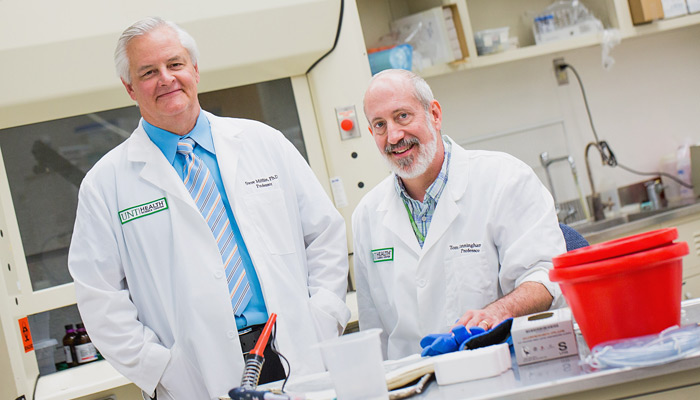Investigating the link between sleep apnea and high blood pressure
When people with sleep apnea stop breathing at night, it’s no surprise that their blood pressure goes up. But what’s less well known is that it stays that way, long after one’s breathing returns to normal.
Researchers at UNT Health Science Center want to figure out why and hope that discovery will lead to better ways to treat the disorder that affects 18 million people.
With the help of a $9.4 million grant from the National Heart, Lung and Blood Institute, Steve Mifflin, PhD, Chairman of Integrative Physiology and Anatomy, and Tom Cunningham, PhD, Professor of Integrative Physiology and Anatomy, are studying the relationship between breathing disturbances and hypertension.
Frequent sleep disturbances are a hallmark of the disorder, which can cause someone to stop breathing as often as 120 times per hour.
“If you stop breathing, your blood pressure is going to go up, but it typically comes down when you start breathing again,” Dr. Cunningham said. “In people who have sleep apnea, their blood pressure remains increased 24 hours a day.”
The research will explore how sleep apnea results in hypertension even when the patients are awake and breathing normally, Dr. Mifflin said.
“We are looking at what mechanism in the brain causes blood pressure to remain elevated throughout the day,” he said.
Hypertension associated with sleep apnea puts an individual at a high risk for heart attack, stroke, kidney disease and other health issues. Lowering the blood pressure even a small amount can be very beneficial, Dr. Cunningham said. Studies show that lowering blood pressure in hypertensive patients by just 6 mmHG can reduce someone’s chances of having a stroke by 30 percent.
A Continuous Positive Airway Pressure machine is the most effective treatment for sleep apnea, but more than half of CPAP users stop treatment, often because of side effects such as dry mouth, stomach bloating and feelings of confinement from the mask.
“What we are hoping to do is come up with some alternative therapeutic approaches to provide more treatment options,” Dr. Mifflin said.






Social media